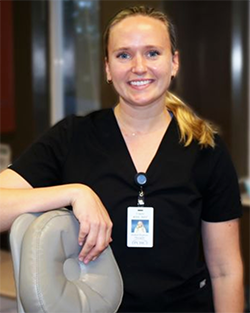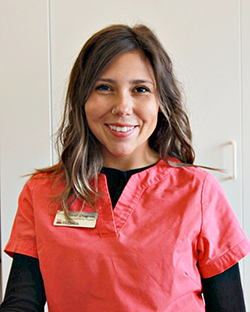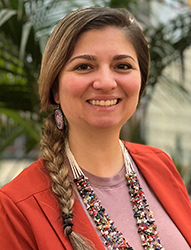The American Dental Therapy Association supports the use
of fluoride as a safe, effective way to strengthen teeth
and help prevent tooth decay. Here's why.
The American Dental Therapy Association supports the use
of fluoride as a safe, effective way to strengthen teeth
and help prevent tooth decay. Here's why.
After four years of board service, American Dental Therapy Association's Claire Surges (Roesler), a registered dental hygienist and advanced dental therapist, has fulfilled her term commitment to the ADTA Board of Directors. She now plans to focus on her clinical practice, expanding dental therapy training programs to more states, and enjoying life as a newlywed. An integral part of the association's executive team, she's demonstrated leadership and commitment to dental therapy during her tenure. From trailblazing as the state of Maine's first licensed dental therapist to serving patients in rural parts of the Midwest, making personal connections with patients and other providers is one of the things she enjoys most about the profession.
In her role as a board director, Surges has served as ADTA's representative for the state of Maine, sat on the conference planning committee, and most recently served as ADTA’s Annual Conference co-chair.

In an article published Feb. 28, 2025, the Associated Press reports that Utah is moving toward becoming the first state in the U.S. to implement a full ban on fluoride in public water systems. Proposed Utah House Bill 81, which does not allow local communities to make individual decisions about adding fluoride, has passed the legislature and is awaiting approval from Governor Spencer Cox. This decision aligns with a broader national debate over fluoride, with prominent figures like Robert F. Kennedy Jr. expressing doubts about its safety and effectiveness. While fluoride is widely considered a major public health achievement, some argue it should be an individual choice, and the bill’s sponsors emphasize the cost savings of discontinuing fluoridation.



Medicaid is a critical program in supporting the health and well-being of millions of families in America. About 230 organizations, including the ADTA and Families USA, submitted a letter to Congressional Leadership in support of Medicaid and to express our united opposition to any proposals to cut Medicaid funding as part of upcoming negotiations over the federal budget, debt limit, or any other legislative priorities.
On Tuesday, April 11, 2023, the Washington State Senate announced the final vote supporting Engrossed Substitute Senate Bill 1678. Sponsored by the House Committee on Health Care & Wellness, the bill passed the House on March 4, 2023, with 53 yeas, 42 nays. The bill proceeded to the Senate where it worked its way through a public hearing, reviews by the Rules Committee, and a final vote resulting in 30 yeas, 19 nays. To view a summary of the bill, including license requirements, the scope of practice, the practice plan contract, and other provisions, click here.
Bill highlights include:
 Four months after graduating with a bachelor’s in dental hygiene and a master’s in dental therapy, Claire Roesler moved from Minneapolis, Minnesota, to Bangor, Maine, where she joined Penobscot Community Health Care (PCHC) as its first dental therapist. As a result, Claire has the esteemed designation of being the first dental therapist to work in the State of Maine. The state adopted legislation in 2014 recognizing dental therapy as a profession; however, the legislation had to be amended in 2019 to allow dental therapists to practice.
Four months after graduating with a bachelor’s in dental hygiene and a master’s in dental therapy, Claire Roesler moved from Minneapolis, Minnesota, to Bangor, Maine, where she joined Penobscot Community Health Care (PCHC) as its first dental therapist. As a result, Claire has the esteemed designation of being the first dental therapist to work in the State of Maine. The state adopted legislation in 2014 recognizing dental therapy as a profession; however, the legislation had to be amended in 2019 to allow dental therapists to practice.
Like all new paths being forged, there were certainly bumps along the way. Claire spent the first four months performing hygienist work while PCHC negotiated a collaborative management agreement with a clear scope of work to practice as a dental therapist. During her first year, Claire advocated extensively for dental therapy in Maine.
 By Sarah Chagnon, ADTA President, Dental Therapist, Swinomish Dental Clinic
By Sarah Chagnon, ADTA President, Dental Therapist, Swinomish Dental Clinic
Dental therapists can fill/restore any part of the tooth as long as the tooth does not need treatment to the nerve. We use all the same materials a dentist would use.

 What sparked your interest in becoming a dental therapist?
What sparked your interest in becoming a dental therapist?
I went in for a dental cleaning and check-up. I told the dentist I had just gotten my associate's degree and was accepted into nursing school. Dr. Dailey encouraged me to shadow a dental therapist who worked at the clinic and recommended that I consider dental therapy instead of nursing school. That night I went home and googled dental therapy and was fascinated by the concept of a mid-level provider. I called the clinic the next day, and job shadowed Daniel Kennedy, the first dental therapist from Alaska to work in Washington State. After watching him for 30 seconds, I knew dental therapy was what I wanted to do. Five months later, I packed up my entire house and took a five-day ferry to Alaska and became a student of the Alaska Dental Therapy Education Program.
The ADTA congratulates board members, Immediate Past President Kari Ann Kuntzelman, and Treasurer Mark Kobylinsky on becoming newly licensed dental therapists in the State of Oregon.
 Kuntzelman, a member of the Chickasaw Nation, moved to Alaska in 2017 to attend the Alaska Dental Therapy Education Program (ADTEP). Upon graduating from the program, she returned home to her urban community in Portland, Oregon, to give back to her people, and join the efforts to end oral health inequity. In 2019, Kuntzelman graduated from the ADTEP Program and worked under Dental Pilot Project #100 in the State of Oregon at the Native American Rehabilitation Association of the Northwest (NARA) for two and a half years. In April 2022, she joined the Northwest Portland Area Indian Health Board as a Dental Health Aide Education Specialist, advocating for dental therapists and other levels of dental health aides. On January 5th, 2023, Kuntzelman became the 11th licensed dental therapist in the State of Oregon.
Kuntzelman, a member of the Chickasaw Nation, moved to Alaska in 2017 to attend the Alaska Dental Therapy Education Program (ADTEP). Upon graduating from the program, she returned home to her urban community in Portland, Oregon, to give back to her people, and join the efforts to end oral health inequity. In 2019, Kuntzelman graduated from the ADTEP Program and worked under Dental Pilot Project #100 in the State of Oregon at the Native American Rehabilitation Association of the Northwest (NARA) for two and a half years. In April 2022, she joined the Northwest Portland Area Indian Health Board as a Dental Health Aide Education Specialist, advocating for dental therapists and other levels of dental health aides. On January 5th, 2023, Kuntzelman became the 11th licensed dental therapist in the State of Oregon.